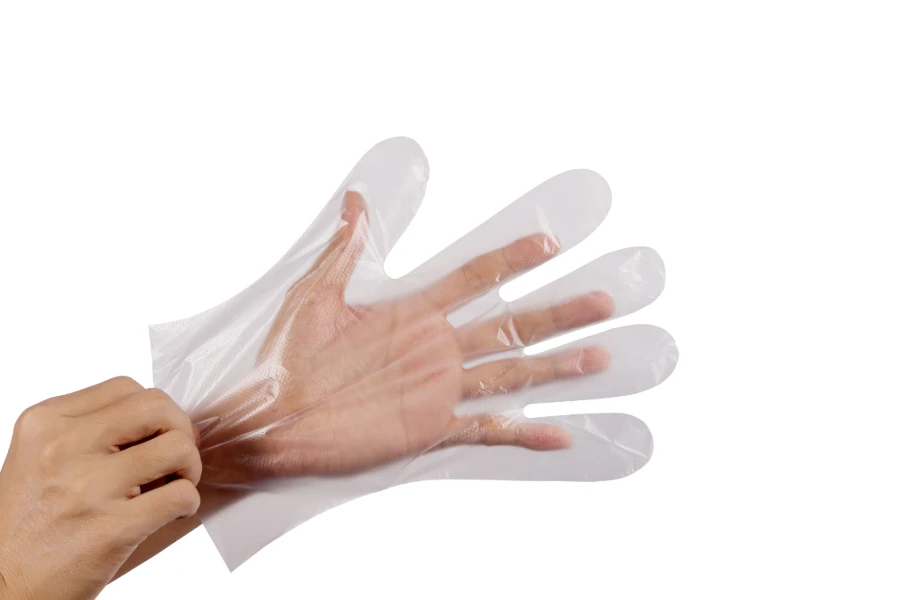As industries and consumers prioritise safety, comfort, and allergen protection, TPE gloves have emerged as a game-changing solution—especially from a trusted latex-free disposable gloves manufacturer. Crafted from thermoplastic elastomer (TPE), these gloves blend flexibility, durability, and affordability, making them a go-to choice for diverse applications. For those grappling with latex allergies or seeking a versatile alternative to traditional gloves, TPE options offer a compelling mix of performance and practicality. Let’s dive into what makes TPE gloves unique, their key benefits, and why they’re gaining traction across sectors.

What Are TPE Gloves? Composition and Core Advantages
Key Benefits of TPE Gloves: From Allergen Safety to Cost-Efficiency
- Latex-Free and Hypoallergenic: By eliminating natural rubber proteins, TPE gloves reduce the risk of allergic reactions, a must for healthcare facilities, schools, and food processing plants where allergen control is non-negotiable. This aligns with global safety standards, including FDA 21 CFR 177.2600, which regulates materials in contact with food and medical products.
- Flexibility and Comfort: TPE’s soft, stretchy texture conforms to hand movements, reducing fatigue during extended wear—ideal for tasks like food preparation, where dexterity matters. Unlike stiffer nitrile gloves, TPE options allow for precise handling of small objects, from utensils to medical tools.
- Cost-Effective: TPE gloves are generally more affordable than nitrile or latex alternatives, making them a budget-friendly choice for high-volume settings such as restaurants, cleaning services, or large-scale events. This cost efficiency doesn’t sacrifice quality; reputable manufacturers ensure TPE gloves meet rigorous strength and barrier standards.
- Disposable Convenience: Designed for single use, TPE gloves minimize cross-contamination risks in hygiene-critical environments. They’re also easier to dispose of than reusable gloves, streamlining workflows in busy kitchens, clinics, or laboratories.
- Resistance to Common Substances: While not as chemical-resistant as heavy-duty nitrile, TPE gloves hold up well against water, oils, and mild detergents—sufficient for most household, food service, and light industrial tasks.
Industries Thriving with TPE Gloves: Use Cases and Applications
- Food Processing and Service: From commercial kitchens to catering events, TPE gloves are a staple. Their latex-free composition and FDA compliance for food contact ensure they meet strict hygiene standards, while their flexibility makes tasks like chopping, plating, and cleaning more efficient. Many food industry professionals rely on TPE gloves for their balance of protection and dexterity.
- Healthcare and Beauty: In clinics, dentists’ offices, and salons, TPE gloves provide a safe alternative for workers and clients with latex sensitivities. They’re ideal for non-invasive procedures like applying creams, administering injections, or handling medical instruments, where allergen safety is paramount.
- Household and Janitorial Work: For everyday tasks like cleaning, pet care, or DIY projects, TPE gloves offer lightweight protection without the bulk. Their affordability makes them accessible for home use, ensuring families can maintain hygiene without overspending.
- Light Industrial Settings: In warehouses, assembly lines, or electronics manufacturing, TPE gloves protect hands from dust, oils, and minor abrasions while allowing for precise handling of components. Their disposable design reduces the risk of cross-contamination between workstations.
INTCO Medical: Setting Standards as the Largest Latex-Free Disposable Gloves Manufacturer
As the largest latex-free disposable gloves manufacturer, INTCO Medical has elevated TPE glove innovation, combining scientific rigour with real-world usability. With a focus on addressing industry pain points—from allergen safety to cost efficiency—INTCO’s disposable TPE gloves are engineered to meet global standards, including FDA and EU certifications for safety and hygiene.








